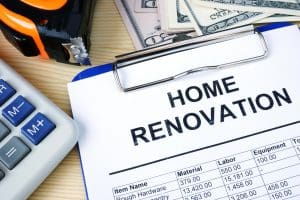Hard money rehab loans are specialized financing options designed for real estate investors aiming to purchase and renovate properties, particularly those requiring significant repairs. Unlike traditional loans, the hard money rehab loan is an asset-based, focusing on the home’s value rather than the borrower’s creditworthiness. The RefiGuide can help you find hard money lenders for rehab.
Everything You Need to Know About Hard Money Rehab Loans
This article reveals the intricacies of hard money rehab loan programs, exploring their features, benefits, drawbacks, and application process.
We will consider hard money loans for bad credit and alternative income documentation opportunities.
There are several private mortgage lenders offering unique hard money rehab loan programs for qualified borrowers and real estate investors.
Understanding Hard Money Rehab Loans
A hard money rehab loan is a short-term, asset-based loan used to acquire and renovate properties. Lenders prioritize the property’s after-repair value (ARV) over the borrower’s credit history. These hard money rebab loans are typically provided by private investors or companies specializing in real estate investments.
Key Features
- Short-Term Duration: Loan terms usually range from six months to two years, aligning with the typical timeline for property rehabilitation and resale.
- Higher Interest Rates: Due to the increased risk for hard money rehab lenders, interest rates are higher than conventional loans, often between 9% and 15%.
- Focus on Property Value: Approval for private money loans are based on the property’s current condition and its potential value post-renovation.
- Flexible Approval Process: The residential rehab hard money lender may overlook poor credit scores if the property’s ARV is promising.
Benefits
- Quick Approval and Funding: The streamlined process allows for faster access to funds, enabling investors to act swiftly in competitive markets.
- Flexible Terms: Hard money lenders can tailor hard money rehab loan terms to fit the specific needs of the project.
- Leverage for Multiple Projects: Investors can undertake several projects simultaneously by leveraging the equity in their properties.
Drawbacks
- Higher Costs: Elevated interest rates and fees can increase the overall cost of the loan.
- Short Repayment Period: The brief loan term requires prompt project completion and property sale or refinancing.
- Risk of Foreclosure: Failure to repay the hard money rehab loan can result in the hard money rehab lender seizing the property.
Hard Money Loan Application Process
- Property Evaluation: Assess the property’s current condition and estimate the ARV after renovations.
- Find a Lender: Research and select a reputable hard money lender experienced in rehab projects.
- Submit a Proposal: Present a detailed plan outlining the purchase price, renovation costs, and projected ARV.
- Underwriting: The hard money rehab lender evaluates the proposal, focusing on the property’s potential value.
- Loan Approval and Funding: Upon approval, funds are disbursed, often in stages corresponding to project milestones.
Hard money rehab loans for investors offer a viable financing solution for real estate investors seeking to purchase and renovate properties quickly. While they come with higher closing costs and shorter terms, their flexibility and speed can be advantageous in the right circumstances. Investors should carefully assess their project’s potential and financial situation before opting for this type of hard money Non-QM loan.
What Credit Requirements Are Hard Money Rehab Lenders Looking For?
Hard money rehab lenders typically place less emphasis on traditional credit requirements compared to conventional lenders.
Instead of focusing solely on credit scores, these private lenders prioritize the value of the property being used as collateral and the borrower’s plan for the project.
However, having a decent credit profile can still influence loan terms.
While traditional lenders may require credit scores of 620 or higher, hard money lenders are more flexible, often working with borrowers who have credit scores as low as 500. They are more concerned with the borrower’s ability to execute the rehab project successfully and repay the loan. Factors like the borrower’s experience in real estate investing, the loan-to-value ratio, and the after-repair value (ARV) of the property weigh more heavily in their decision.
Hard money rehab lenders also review any significant credit events, such as bankruptcies or foreclosures, to assess overall risk. A strong plan, including a detailed budget and timeline for renovations, can often offset weaker credit scores. While credit history is not the primary focus, having a solid financial foundation can lead to better loan terms, such as lower interest rates or reduced closing costs. Borrowers should prepare to demonstrate their project’s potential profitability to secure favorable terms for a real estate investment loan.
What Are the Loan-to-Value Requirements for Hard Money Rehab Loan Programs?
Loan-to-value (LTV) requirements for hard money rehab loan programs typically range from 60% to 70% of the property’s current market value, though some lenders may go as high as 75% for qualified borrowers. LTV is a key metric that lenders use to assess the risk of the loan, calculated by dividing the loan amount by the property’s appraised value. Unlike traditional loans, hard money lenders focus on the property’s potential after-repair value (ARV) rather than just its current value. For rehab loans, lenders often base their decision on the ARV, offering up to 65% to 70% of the ARV.
For example, if a property’s current value is $200,000 and its ARV is projected at $300,000 after renovations, a lender might approve a loan for up to $210,000 (70% of the ARV). Borrowers are typically required to invest their own funds to cover the difference between the loan amount and the purchase or renovation costs, ensuring they have a stake in the project. Meeting the LTV requirement depends on the borrower’s equity in the property, the project’s feasibility, and the lender’s risk tolerance. A lower LTV generally results in better loan terms, such as reduced mortgage rates, lending fees and closing costs.
Hard Money Rehab Loan vs Conventional Rehab Loans
When financing property renovations, investors often choose between hard money rehab loans and conventional rehab loans. Each option has distinct features, benefits, and drawbacks. Understanding these differences between a conventional and hard money loan is crucial for selecting the home rehabilitation financing that best aligns with your investment strategy.
Hard Money Rehab Loans
Hard money rehab loans are short-term, asset-based loans provided by private money lenders or investor groups. These home renovation loans focus primarily on the property’s value, particularly its after-repair value (ARV), rather than the borrower’s creditworthiness.
Key Characteristics:
- Approval Process: Emphasizes the property’s ARV, allowing for quicker approvals and funding, often within days.
- Loan Terms: Typically short-term, ranging from six months to two years, aligning with the timeline for property rehabilitation and resale. (also consider the bad credit home equity loans if you already have a low mortgage rate on your current mortgage and just need cash out.)
- Interest Rates and Fees: Higher interest rates, often between 10% and 15%, with additional fees such as origination points. (some hard money lenders will offer a cash out refinance with bad credit that accomplishes the same goal as a typical home rehab loan.
- Down Payment: May require a substantial down payment, often around 20% to 30% of the property’s purchase price.
Advantages:
- Speed: Rapid approval and funding enable investors to act swiftly in competitive markets.
- Flexibility: Less stringent credit requirements and adaptable loan terms cater to various investment scenarios.
Disadvantages:
- Cost: Higher interest rates and fees increase the overall cost of borrowing.
- Short Repayment Period: The brief loan term necessitates prompt project completion and property sale or refinancing.
Conventional Rehab Loans
Conventional rehab loans, such as Fannie Mae’s HomeStyle Renovation Mortgage and Freddie Mac’s CHOICE Renovation loan, are traditional financing options offered by banks and mortgage lenders. These loans combine the property’s purchase price and renovation costs into a single mortgage.
Key Characteristics:
- Approval Process: Involves thorough evaluation of the borrower’s credit history, income, and debt-to-income ratio, leading to longer approval times.
- Loan Terms: Longer terms, typically 15 to 30 years, with fixed or adjustable interest rates.
- Interest Rates and Fees: Lower interest rates compared to hard money loans, with standard closing costs and fees.
- Down Payment: Lower down payment requirements, often as low as 3% to 5% of the total loan amount.
Advantages:
- Cost-Effectiveness: Lower interest rates and longer repayment terms reduce monthly payments and overall borrowing costs.
- Predictability: Fixed interest rates offer stable monthly payments over the loan’s duration.
Disadvantages:
- Approval Time: The comprehensive underwriting process can delay funding, potentially causing investors to miss time-sensitive opportunities.
- Stringent Requirements: Higher credit score and income requirements may exclude some borrowers.
Comparative Analysis
Speed and Flexibility:
Hard money rehab loans provide rapid access to funds with flexible terms, benefiting investors needing quick financing for time-sensitive deals. In contrast, conventional rehab loans involve a more extensive approval process, which can delay funding but offer more favorable terms.
Cost Considerations:
While hard money loans offer speed and flexibility, they come with higher interest rates and fees, increasing the cost of borrowing. Conventional rehab loans, with their lower interest rates and longer terms, are more cost-effective but require more time and stringent qualifications.
Risk Assessment:
Hard money lenders focus on the property’s ARV, making them more willing to finance riskier projects. Conventional lenders assess the borrower’s financial stability, favoring less risky investments.
Reasons to Get a Hard Money Loan for Rehab
Before applying for a hard money loan, evaluate whether it aligns with your needs and financial goals.
- Is It for an Investment Project? Hard money loans are ideal for short-term financing needs, such as flipping a house or renovating a rental property. If you’re purchasing a primary residence and have high credit scores and the ability to document your income traditionally, options like conventional or FHA financing are typically better suited.
- Do You Have Experience in Flipping Homes? First-time house flippers may struggle to qualify for a hard money loan. Lenders often prefer borrowers with experience in real estate investments and hard money loans as they are seen as lower-risk candidates.
- Do You Have Additional Funds? Hard money loans rarely cover 100% of costs, so you’ll need funds for a down payment or expenses the loan won’t cover. If your property does not sell quickly, you may face unexpected financial burdens. Having supplementary funds can determine whether you are approved and protect you from financial overextension.
Takeaway on Conventional and Hard Money Rehab Loans
Choosing between a hard money rehab loan and a conventional rehab loan depends on the investor’s specific needs, financial situation, and project timeline. Hard money loans offer speed and flexibility at a higher cost, suitable for investors needing quick financing. Conventional rehab loans provide cost-effective financing with longer terms but require more time and stringent qualifications. Investors should carefully evaluate their circumstances and project requirements to select the most appropriate financing option.
The RefiGuide can help you shop private lenders that offer the most attractive hard money rehab loans that meet your eligibility and financial goals.
References
- Nav. (2024). Best Hard Money Loans With 100 Percent Financing.
- Ownerly. (2024). What Is a Rehab Loan and How Does It Work?.


